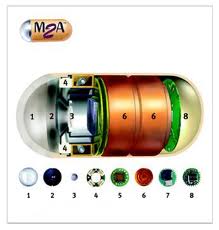
What's Capsule Endoscopy?
Capsule endoscopy is a way to record images of the digestive tract for use in medicine. The capsule is the size and shape of a pill and contains a tiny camera. After a patient swallows the capsule, it takes pictures of the inside of the gastrointestinal tract. The primary use of capsule endoscopy is to examine areas of the small intestine that cannot be seen by other types of endoscopy such as colonoscopy or esophagogastroduodenoscopy.
Capsule Endoscopy lets a patient’s physician analyze the lining of the middle a part of his/her gastrointestinal tract, which include the three portions from the small intestine. Patients physician provides him/her with a pill sized camcorder for the patient to swallow. This camera features its own light source and takes pictures of your small intestine since it passes through. These images are sent to a small recording device you need to wear on your body. Your physician will be able to view these pictures at a later time and could possibly provide you with useful information regarding your small intestine.
Why is Capsule Endoscopy Done?
Capsule endoscopy helps your physician assess the small intestine. This part of the bowel cannot be reached by traditional upper endoscopy or by colonoscopy. The most common reason for doing capsule endoscopy is to search for a reason for bleeding in the small intestine. It might be also helpful for discovering polyps, inflammatory bowel illness, ulcers, and tumors of the small intestine.
How one person can be prepared for the Procedure?
An empty stomach enables the very best and safest examination, so you must have absolutely nothing to eat or drink, including water, for approximately twelve hours before the examination. Your doctor will explain when to start fasting. Inform your doctor in advance about any medications you are taking including iron, aspirin, bismuth subsalicylate items and other over-the-counter medications. You will need to adjust your usual dose before the examination. A patient should discuss any allergies to medications as well as medical conditions, such as swallowing disorders and heart or lung disease. Tell your doctor from the presence of a pacemaker or defibrillator, previous abdominal surgery, or previous history of bowel obstructions in the bowel, inflammatory bowel disease, or adhesions. Your doctor may request you to perform a bowel preparation/cleansing before the evaluation.
What can a patient Expect during Capsule Endoscopy?
a patient’s physician will get him/her prepared for the examination by applying a sensor device for your abdomen with adhesive sleeves (similar to tape). The pill-sized capsule endoscope is swallowed and passes naturally through your digestive system while transmitting video images to a data recorder worn on your belt for approximately eight hours. At the end of the procedure you'll return to work and the data recorder is removed so that images of your small bowel can be used on a screen for physician to examine. Most sufferers think about the test comfortable. The capsule endoscope is about how big a sizable pill. After ingesting the capsule and until it's excreted you should not be near an MRI device or schedule an MRI examination.
What goes on After Capsule Endoscopy?
You will be able to drink clear liquids after two hours and eat a mild meal after 4 hours following a capsule ingestion, unless your physician instructs you otherwise. You will have to avoid vigorous exercise such as running or jumping during the study. Your doctor generally can tell you the test results within the week following a procedure; however, the results of some tests might take longer.
What are the Possible Complications of Capsule Endoscopy?
Although complications can occur, they are rare when doctors who're specially trained and experienced in this procedure perform the test. There is possibility of the capsule to be stuck at a narrowed spot in the digestive system leading to bowel obstruction. This usually relates to a stricture (narrowing) from the digestive system from inflammation, prior surgery, or tumor. It’s important to recognize obstruction early. Signs of obstruction include unusual bloating, abdominal pain, nausea or vomiting. You should call your doctor immediately for any such concerns. Also, if you create a fever after the test, have trouble swallowing or experience chest pain, tell your doctor immediately. Take care not to prematurely detach the machine because this may lead to lack of pictures being delivered to your recording device.
Capsule endoscopy may also be called:
- capsule enteroscopy
- wireless capsule endoscopy
Capsule endoscopy enables study of the small intestine, which can't be easily reached by conventional methods of endoscopy.





